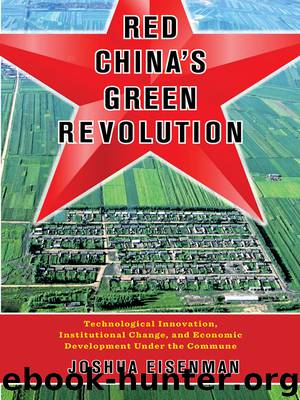Red China's Green Revolution by Joshua Eisenman

Author:Joshua Eisenman
Language: eng
Format: epub
Tags: SOC026020, Social Science/Sociology/Rural, HIS008000, History/Asia/China
Publisher: Columbia University Press
Published: 2018-04-10T04:00:00+00:00
At the time of Wan Li’s six-point proposal, national policy explicitly prohibited contracting down to the household and Wan Li could not oppose national policy. But when Deng saw the Anhui Party Committee’s six-point proposal, produced under Wan Li’s leadership, he, like a number of other officials, immediately affirmed the value of the experiment.91
Meanwhile, in November 1977, Jilin fixed its commune extraction rates at a maximum of 10 percent, and in Sichuan, Zhao Ziyang promulgated a provincial document affirming the Sixty Articles. Gansu followed suit the following March.92 In December 1977, the People’s Daily praised Zhao for introducing a provincial initiative advocating the distribution of more collective income to the household.93 The goal, as Zhao explained on Sichuan provincial radio, was to “press the center (the commune and brigade) and guarantee the two ends (the household and the state).”94 On February 1, 1978, Deng met Zhao in Sichuan, told him about Anhui’s six-point proposal, and encouraged him to follow Wan’s lead. Zhao, who had already begun similar experiments, quickly developed his own twelve-point program.95 By reaffirming the Sixty Articles, Deng’s provincial-level supporters appeared to be reinforcing existing policy. In hindsight, however, is it clear that these proclamations provided political cover for them to promote household-based farming.96
Writings and speeches like Wan’s six points, which conveyed the team’s interests in ways that placed them at odds with the commune and brigade, tore the institution’s subunits apart. Teams were told that they would be better off without the commune and brigades extracting their income. The critique of Mao’s advocacy of selflessness (i.e., voluntarism) reasoned that farmers should support team rather than brigade ownership. “The reformers gave team leaders a stake in the reforms,” Zweig explains, thus intentionally creating the misperception that decollectivization was initiated at the local level.97
Collective remuneration was attacked under the ostensibly innocuous slogan “Carry out rural economic policy” (luoshi nongcun jingji zhenge). To increase household consumption at the collective’s expense, Deng’s provincial-level supporters encouraged households to emphasize their private plot and cottage enterprises. In early 1978, even as Hua remained supreme in Beijing, opposition to the loyalists and support for household contract farming was galvanized using official provincial press outlets, public speeches, and provincial party meetings. In January and February 1978, the People’s Daily reemphasized the role of the private sector in the rural economy under the Sixty Articles.98 In April 1978, the People’s Daily commended the party committee in Qidong County, Jiangsu, for ordering its communes and brigades to return 19 million yuan they had extracted from their teams.99
In March 1978, Deng told the Political Research Office at the State Council that he supported “payment according to labor” and opposed Dazhai workpoints.100 In Red Flag, Wan Li advocated the “responsibility system” (zirenzhi). To improve worker oversight, Wan proposed that subteam workgroups, akin to the Mutual Aid Teams of the mid-1950s, be assigned specific tasks and rewarded a fixed number of workpoints.101 This policy turned compensation into a private, rather than a public, process—one that was a small step from direct cash payments to households for agricultural products.
Download
This site does not store any files on its server. We only index and link to content provided by other sites. Please contact the content providers to delete copyright contents if any and email us, we'll remove relevant links or contents immediately.
The Brazilian Economy since the Great Financial Crisis of 20072008 by Philip Arestis Carolina Troncoso Baltar & Daniela Magalhães Prates(117874)
International Integration of the Brazilian Economy by Elias C. Grivoyannis(87731)
The Art of Coaching by Elena Aguilar(52870)
Flexible Working by Dale Gemma;(23239)
How to Stop Living Paycheck to Paycheck by Avery Breyer(19616)
The Acquirer's Multiple: How the Billionaire Contrarians of Deep Value Beat the Market by Tobias Carlisle(12206)
Thinking, Fast and Slow by Kahneman Daniel(12012)
The Radium Girls by Kate Moore(11891)
The Art of Thinking Clearly by Rolf Dobelli(10167)
Hit Refresh by Satya Nadella(9011)
The Compound Effect by Darren Hardy(8769)
Tools of Titans by Timothy Ferriss(8178)
Atomic Habits: Tiny Changes, Remarkable Results by James Clear(8154)
Turbulence by E. J. Noyes(7913)
A Court of Wings and Ruin by Sarah J. Maas(7604)
Change Your Questions, Change Your Life by Marilee Adams(7597)
Nudge - Improving Decisions about Health, Wealth, and Happiness by Thaler Sunstein(7518)
How to Be a Bawse: A Guide to Conquering Life by Lilly Singh(7359)
Win Bigly by Scott Adams(7065)
